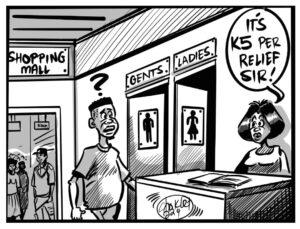The Bank of Zambia (BoZ) has warned that attempts to re-introduce deputy ministers will add to the cost of running government as these office bearers will be an additional charge on revenues.
And the BoZ has insisted that in order for the Constitution-making process to be legitimate, it must be inclusive, and that no party should control it.
Meanwhile, the central bank says proposals to amend Article 193 (1) of the Constitution Act by providing for the establishment of the Anti-Drugs, Economic and Financial Crimes Agency is likely to interfere with in the operations of the existing law-enforcement agencies.
In their 10-page submission on the Constitution Amendment Bill Number 10 of 2019 to the parliamentary Select Committee, the BoZ warned that attempts to re-introduce deputy ministers will add to the cost of running government as these office bearers will be an additional charge on revenues.
According to Section 38 of the controversial Bill, there is a proposal to amend the Constitution Act by the insertion of a new Article 117A, which gives power to the President to appoint Deputy Ministers.
But the BoZ countered by saying the move would lead to government incurring huge costs.
“This provision will add to the cost of running government as these office bearers will be an additional charge on Government revenues, which can be well utilized to improve delivery of social benefits to the citizenry,” the submission reads.
“It is also not clear how the current arrangement has prevented government’s ability to function effectively and efficiently. We firmly believe that efforts towards efficiency and effectiveness in service delivery must target the technocrats, who are the implementers of government policy.”
And the BoZ insisted that in order for the Constitution-making process to be legitimate, it must be inclusive, and that no party should control it.
“The stark lessons learned from various constitutional processes that have taken place all over the world is that the process of adopting the Constitution is as important as its substance, and the process must be legitimate for it to be acceptable to all stakeholders. In order for the process to be legitimate, it must be inclusive. No party, whatsoever, should control it. A constitution should be the product of the integration of ideas from ALL stakeholders in the country, including political parties, both within and outside Parliament, civil society, and individuals in society,” BoZ stated.
“We firmly believe the Constitution should be a long-term document for successive governments. It should, therefore, create strong institutions.”
Meanwhile, the central bank submitted that proposals to amend Article 193 (1) of the Constitution Act by providing for the establishment of the Anti-Drugs, Economic and Financial Crimes Agency was likely to interfere with in the operations of the existing law-enforcement agencies.
Section 69 of the Bill Proposes to amend Article 193 (1) of the Constitution Act by providing for the establishment of the Anti-Drugs, Economic and Financial Crimes Agency.
“We note that the specific roles of the Anti-Drugs, Economic and Financial Crimes Agency have not been stated as is the case for all others created by the same Article, such as, the Zambia Police Service (Article 193 (2), Zambia Security Intelligence Service (Article 193 (3), and the Zambia Correctional Service (Article 193(4)). It is our considered view that in the absence of clearly stated mandate of this Agency, there is likely to be operational interference with the existing Drug Enforcement Commission and the Financial Intelligence Centre, which have been recognized internationally as doing good work for the country,” BoZ added.
Other submissions were made on the contentious issue of civil servants’ participation in active politics after they retire or resign from the civil service.
Section 66 of the Bill proposes amendments to Article 186 dealing with participation of public officers in politics.
“While the proposed amendment speaks to the introduction of a time limit for resigning, there is lack of clarity on whom the Article applies to in light of Article 186 (2), which qualifies that it applies to Constitutional Office Holder. Constitutional office holders, according to Article 266 are only the Attorney General, Solicitor General, Director of Public Prosecutions, Public Protector, Secretary to the Cabinet, Secretary to the Treasury, and Permanent Secretaries. To eliminate the ambiguity, we would propose that Articles 186(1) and 186(2) are merged to provide that a public officer holding a Constitutional Office who seeks election, or is appointed, to a state office shall resign. It is also our considered view that the cooling off period of 2 years is not only too long, but is also discriminatory as it relates to constitutional office holders and does not apply to the entire public service. Since the cooling off period is a derogation of the affected person’s right to participate in the governance of their country, perhaps a much lower period of say six months to one year may be more justifiable,” stated BoZ, who also stressed that the central bank should retain its primary function of implementing and formulating monetary policy.












